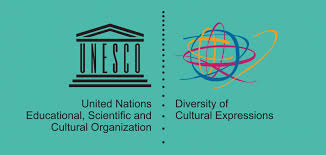
The UNESCO Convention on the Protection and Promotion of the Diversity of Cultural Expressions was adopted by the UNESCO General Conference on 20 October 2005 during the 33rd Session of the UNESCO General Conference held in Paris, France, on 3-21 October 2005. The Convention complements the previously established provisions of UNESCO, including the Universal Declaration on Cultural Diversity of 2001.
The Convention on the Protection and Promotion of the Diversity of Cultural Expressions is a legally-binding international agreement that ensures that artists, cultural professionals, practitioners and citizens worldwide may create, produce, disseminate and enjoy a broad range of cultural goods, services and activities, including their own. It was adopted because the international community signalled the urgency for the implementation of international law that would recognise:
- The distinctive nature of cultural goods, services and activities as vehicles of identity, values and meaning;
- That while cultural goods, services and activities have important economic value, they are not mere commodities or consumer goods that can only be regarded as objects of trade.
Recognizing that culture can no longer be just a by-product of development, but rather the mainspring for sustainable development, the Convention ushers in a new international framework for the governance and management of culture by:
- Encouraging the introduction of cultural policies and measures that nurture creativity, provide access for creators to participate in domestic and international marketplaces where their artistic works/expressions can be recognized and compensated and ensure these expressions are accessible to the public at large;
- Recognizing and optimizing the overall contribution of cultural industries to economic and social development, particularly in developing countries;
- Integrating culture into sustainable development strategies and national development policies;
- Promoting international cooperation to facilitate the mobility of artists as well as the flow of cultural goods and services, especially those from the South.

